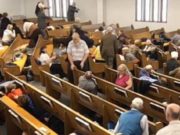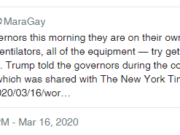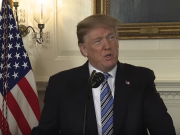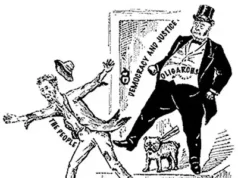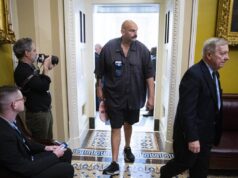Federal district court judges don’t have national jurisdiction, nor did we intend to permit those judges to substitute their judgement for that of the elected president on issues of national security. What we have before us is judicial jihad.
“The judicial Power of the United States shall be vested in one supreme Court, and in such inferior Courts as the Congress may from time to time ordain and establish.”
I didn’t make that up. It’s in the Constitution. The founders never intended for an ‘inferior court” to have national jurisdiction over decisions of the President. In fact, contrary to novel legal theories, Article III doesn’t convey upon an inferior court the same national power of the Supreme Court.
Article III, rather, gives Congress the right to create inferior courts, and define their powers. This it did.
Some commentators have called the inexplicable rash of rulings by federal district court judges on the President’s travel ban judicial tyranny. It is. These rulings are a predictable outcome when we permit plaintiffs to forum shop for sympathetic federal judges ill-suited to address legal issues on the merits. When these courts and judges rise up to exceed their authority for a political purpose, you have judicial jihad.
The War on Trump continues. As I warned, it includes lawyers, judges, and the deep state. No member of the deep state is deeper than an Article III federal judge whose actions, irrespective of motive or competency, are essentially beyond safeguard. That may sound extreme. It’s not. The Supreme Court can ultimately hold rogue judges account. However, the manner in which rogue judges are using their power now eliminates both proper presidential authority and ultimately negates later judicial oversight by the high court.
Rogue federal district court judges are now using the TRO as a legislative veto to stop a president they oppose.
These judges also know that the effect of these TRO orders is that they end a President’s policy. They also know that when they issue a national injunction, they stop enforcement of national security prerogatives and place a president’s policy initiatives on a long slow train up the judicial ladder. Courts don’t issue a TRO lightly, nor should they. I know, I’m a real lawyer and I have been before state and federal courts on TRO’s, even in the last 30 days. It’s an extreme remedy because it essentially decides a case before the merits of a case.
Seeking a TRO against a sitting President on national security matters is serious business, and the threshold for granting such a TRO could never be higher. In reality, these issues don’t belong before just any federal judge.
When a federal district court judge issues a TRO vetoing Presidential action, the judge claims for him or herself power, discretion, and jurisdiction no one ever contemplated for an “inferior” court or judge.
A federal district court judge in Hawaii has no jurisdiction outside his or her district. The same is true for any federal district court judge. There are 94 Federal District Court districts in this country, and those courts have great power. That power, however, is limited. Congress, under the powers of Article III, confine the reach of these courts to those specific districts.
In the federal system, federal district courts are the lowest level rung on the judicial ladder. They are the least authoritative Courts in the Federal judiciary. As such, these Courts and their judges have no business making decisions on the merits of cases that veto presidential authority. Likewise, their jurisdiction has been set, and it is confined to their respective boundaries.
Neither the Constitution nor Congress ever considered that these inferior courts would have broad, nationwide power. And, even if your think the Constitution might have granted that power when in Article III it granted the federal judiciary powers in all cases and controverseys, those powers are limited by Congress to certain jurisdictions. When a court has before it a case in it’s district, it may rule upon that case as it affects the parties, and it may even apply the ruling more broadly across the district, based on accepted precedent. It’s powers go no further.
Parties may appeal cases or controversies arising from lower federal district courts. When the parties do that, the appeals go to the Circuit Court of Appeals in which the district sits. There are 12 regional Federal Courts of Appeals, not including the specialized Federal Circuit Court. Those Federal Appeals Courts likewise don’t have jurisdiction outside their defined Circuit. In fact, it is not uncommon for different circuits to have different interpretations of the law on issues. It is that conflict among the Circuits that most often give rise to the Supreme Court hearing an appealing and resolving the Circuit “split.” That is because there is “only one Supreme Court.” It is the Supreme Court that has national jurisdiction.
May the Supreme Court step in and issue a national injunction …. it could, and it has. It does so because it has national jurisdiction.
When commenters and conservatives talk about the expansion of government, sometimes lost in that discussion is the growing, expansive, unchecked power of the Federal judiciary, which is nothing more than big government in black robes. We don’t need federal district court judges expanding their jurisdiction to a national reach. There is no basis for this over-reach, and indeed, it greatly changes the balance of power among the three co-equal branches of our Republic.
This power grab of jurisdiction didn’t start as part of the war on Trump. It’s been going on for too long. It is just that now plaintiffs and partisan judges are using the power grab as a weapon against a sitting President to effectively steal policy making and to veto federal policy. It must end today. It is nothing less than a judicial jihad.
Most Americans don’t have any way of knowing that politically motivated and funded plaintiffs are selecting left-wing lawyers to hand-pick legal districts in which to bring cases against the President. They do this in order to get a predictable result. They choose courts and judges who have both an expansive view of their jurisdiction and who are favorably disposed toward a predictable political outcome. They game the system, which lawyers have regrettably done for years in the practice of forum shopping. That practice permits lawyers who may bring a case in more than one jurisdiction to seek out a “friendly” or predictable jurisdiction to bring a case. Is this how we want national security issues to be resolved in this country?
Legal commentators will counter and say that issues such as immigration and national security require continuity, and thus a court must make a ruling that keeps those matters uniform across the country. I understand that argument. However, it doesn’t convert local jurisdiction of a federal judge into national jurisdiction. Congress should step in and stop this judicial abuse today.
Plaintiffs seeking to stop a presidential initiative or executive order by method of a TRO or preliminary injunction should bring a Writ directly to the Supreme Court. Only the Supreme Court is a co-equal of the President.
The founders never intended for an ‘inferior court” to have national jurisdiction over decisions of any president. This dangerous trend is nothing more than judicial jihad.
Author: Richard Kelsey
Richard Kelsey is the Editor-in-Chief of Committed Conservative.
He is a trial Attorney and author of a #11 best-selling book on Amazon written on higher education, “Of Serfs and Lords: Why College Tuition is Creating a Debtor Class”
Rich is also the author of the new Murder-Mystery series, “The ABC’s of Murder,” book one is titled, “Adultery.”
Rich is a former Assistant Law School Dean and Law Professor. At Mason Law Kelsey conceived of, planned, and brought to fruition Mason’s Center for the Protection of Intellectual Property, known as CPIP, drawing on his expertise as a former CEO of a technology company specializing in combating cyber-fraud.
In 2014 he was elected by the graduating class as the faculty speaker at their graduation.
He is a regular commentator on legal and political issues in print, radio and on TV. Rich has appeared on hundreds of stations as a legal expert or political commentator. He provided the legal analysis for all stages of the Bob McDonnell trial and appeal for numerous outlets including NPR and WMAL.
Rich also writes on occasion for the American Spectator and CNSNews.com.
In his free time, Rich is part of the baseball mafia of Northern Virginia, serving on numerous boards and as a little league and travel baseball coach.
His Twitter handle is @richkelsey.





